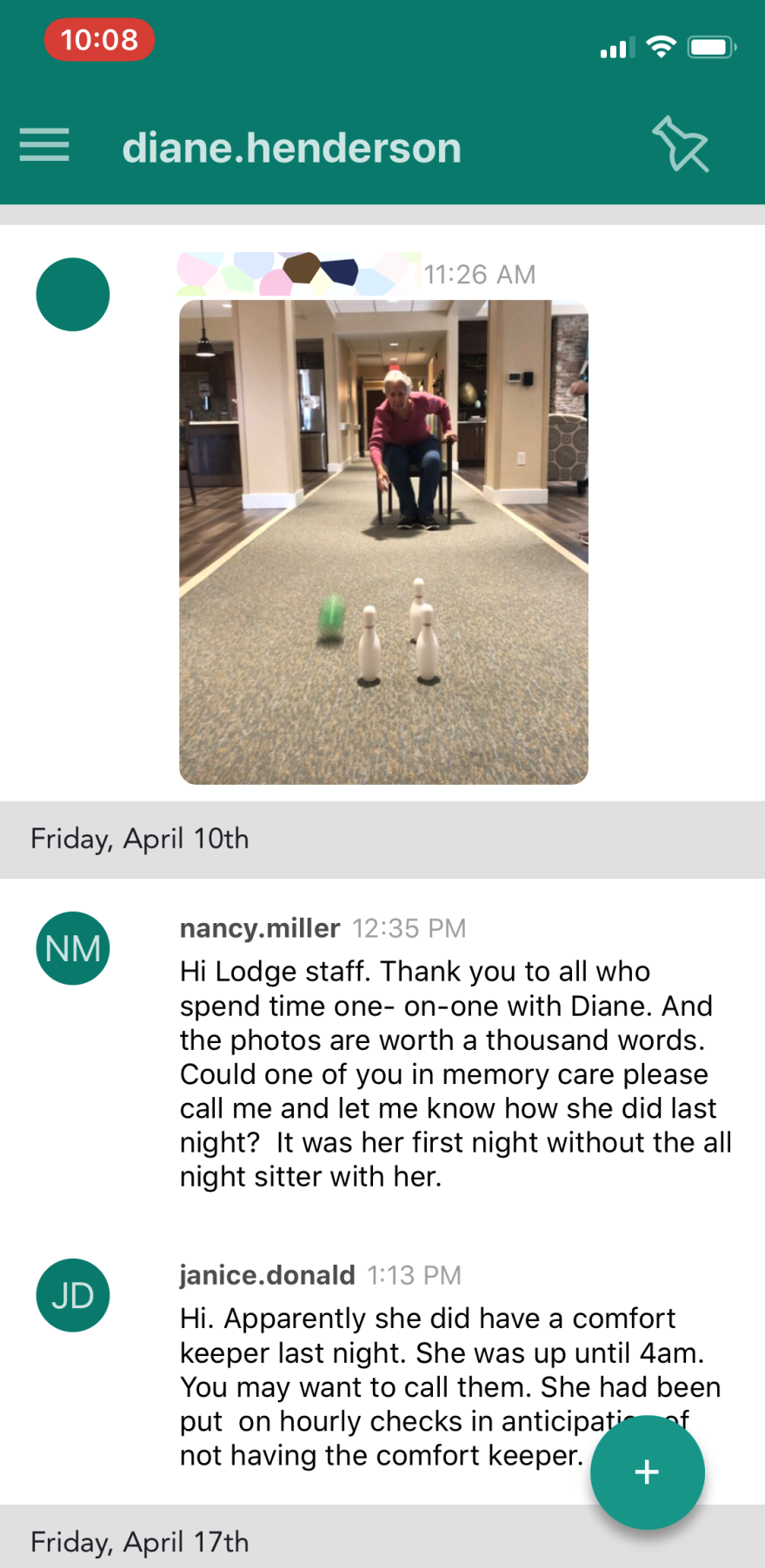Nancy Miller misses going on walks with her older sister Diane Henderson. Henderson is 82 and has Alzheimer's disease and dementia.
"I went a lot to visit her on days when the weather was warm enough this winter for us to go outside and go for walks," Miller said. "My sister loves to walk."
Henderson lives in the memory care unit at The Lodge at Grand Junction. Miller had not seen her in over two months because of the state's coronavirus restrictions.
Recently, Miller was able to visit with her sister twice outside the facility. They both wore masks and kept their distance.
Otherwise, they talk a couple of times a week via FaceTime.
"Means so much to me to be able to talk to her and see her face," Miller said. "Even though she has dementia she is still there and she is still my sister and we tell each other we love each other."
But Miller is using another way to stay connected, an app called Serenity Engage.
Serenity Engage is a HIPAA-compliant mobile messaging platform that allows senior care communities to communicate with family members. The app was created by Serenity, Inc., a Denver-based startup that is working with facilities in Colorado, New Jersey and Georgia.
Founder and CEO Katherine Wells created the company after her own experiencewith her parents who were in long-term care communities.
"I felt like as a family member I went into a black hole and I had no idea what was happening unless I was physically there," she said.
The messaging app is a little over a year old. It allows a provider, like the facility's staff or a doctor, to exchange updates, photos and non-emergency information quickly and easily with family members.
"Like Nancy (Miller), when you have someone in care who has dementia you can't really trust their self-report," she said.
Serenity Engage not only strengthens the relationship between staff and families, but Wells said it also allows loved ones, like Miller, to be a part of her sister's care team.
"I can send messages, asking questions about how she's doing or for somebody to call me and tell me if her new shoes fit or not because I can't go in and try them on for her," Miller said. "So, the staff has to help me with that kind of stuff."
The Lodge at Grand Junction has been using Serenity Engage since December. It provides the app free of charge to all residents and their families.

"The more I saw the more I was like, 'Oh my gosh, this could be a game-changer for us.' Because communication is so key to what we do," Janice Donald, executive director of The Lodge, said.
But when you're trying to communicatewith that many people it can get a little overwhelming.
Serenity Engage has been a godsend during the coronavirus pandemic, said Donald. If a family member sends a message, The Lodge receives it immediately.
"So, we can either respond right away or get the right person to respond to it right away," she said.
Life is slowly returning to normal in Colorado as businesses and restaurants reopen. But in-person visits to long-term and residential care facilities are still not allowed under the state's "safer-at-home" order.
Senior care communities have some of the highest rates of COVID-19 cases in the state and across the country. So far, there are no confirmed cases at The Lodge and Donald sends out weekly updates to families through the app.
"There's a lot of isolation for everybody," she said. "So being able to have this communication tool especially, with pictures and the snippets of their daily life, just gives to me (and) I'm hoping it gives families, a little sense of relief and peace that things are going well."
Serenity Engage is still a work in progress. Residents often see several providers like physical therapists, physicians and home health workers. But not all of them use the app. This means families are still making several calls to get updates or a facility's staff must pass along the information.
"My vision of the perfect world is that if we have all those entities involved in the residents' care," Donald said. "If they're all on the same app then it's, it's just a one stop shop. It's not there yet, but I can see that being very beneficial.
Wells agrees and said the company wants to expand the app's capabilities. This includes increasing provider access and adding features like video and telemedicine.
"We'll be talking with our clients as we continue down that road and they'll help guide us in the right direction," she said.
In the meantime, Nancy Miller is already benefitting. A staff member sent her a photo of Henderson, her sister, seated in a chair, bowling.
"This was great because she's maintaining her social distance and I actually couldn't believe that they got her to do this," she said.
Miller is still learning how to use all the features on the app but says it's a relief to be able to easily check on her sister. Especially since senior care communities remain closed to visitors.
"I can't be there right now, so it's the next best thing."







